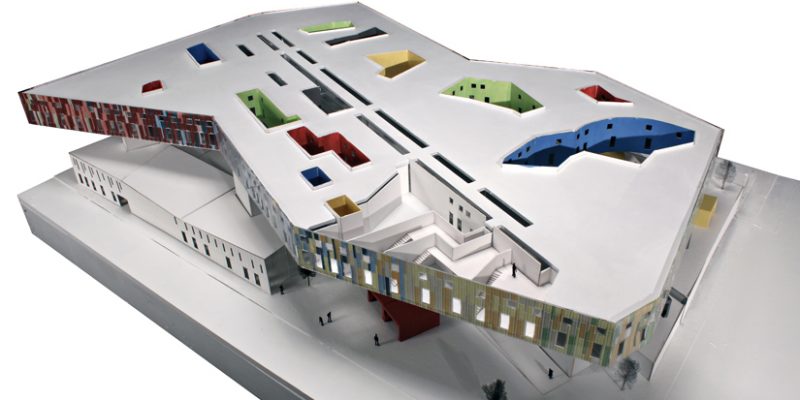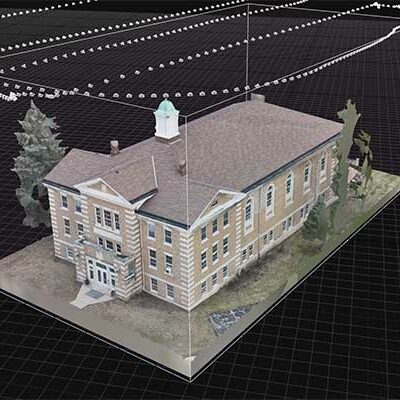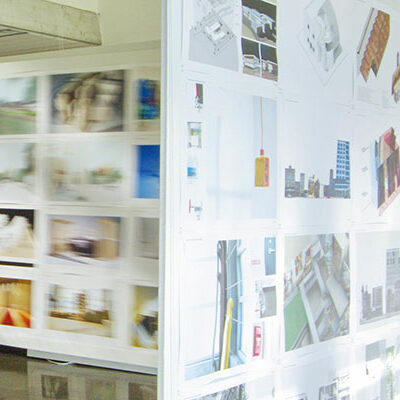What’s Surf – Students Working with Faculty
The SURF grant, Support for Undergraduate Research Fellows, is a University grant awarded to student researchers to participate on faculty research projects. Faculty in the Department of Architecture have been very successful in obtaining SURF grants.
This program is designed to foster faculty-student research collaborations, and, as such, the UWM Office of Undergraduate Research (OUR) is particularly eager to fund work through which students have the opportunity to engage in thoughtful and progressively sophisticated work central to the overall research program of the principal investigator. SURF awards are part of larger efforts to foster a culture of faculty-undergraduate research collaboration at UWM.
2022
Research Students: Liam Farin, Urban Studies Programs and Tannis Thompson-Catlett, Public Health
This summer research project aims to examine how urban gardens contribute to equitable food access in Milwaukee’s marginalized and underserved communities. In summer 2022 the Buildings-Landscapes-Cultures field school project will examine, document, and evaluate the success of the Cherry Street Community Gardens BloomMKE’s Cherry Street Garden a community-owned growing space located on 1437 N 23rd St in Milwaukee’s Midtown neighborhood. Every summer the BloomMKE team collects produce from the garden and distributes “food boxes” to community residents and elders who live in a nearby senior living facility.
Our methods are ethnographic, empirical, and qualitative in nature. The research team will interview growers, administrators, and elderly recipients (of the food boxes) to document how local food is produced, harvested, and distributed to vulnerable residents. The BLC research team will document and disseminate the successes, difficulties, and innovative strategies used by BloomMKE. The research team members will conduct participant observations by working alongside the BloomMKE team as they harvest and distribute food. This immersive engagement will provide the research team with a deeper understanding of community gardening, food justice, and healthy eating processes.
Research Students: Marina Fabela, Alicia Kandall, Andrea Mendoza, Andrea Garcia-Rangel, Jacob Rohan, and Megan Schulte
The “Constructing Equitable Terrain” summer SURF grant recipients Marina Fabela, Alicia Kandall, Andrea Mendoza, Andrea Garcia-Rangel, Jacob Rohan, and Megan Schulte will be working with adjunct professor Chelsea Wait, to create resources, events, and procedures that foster diversity, equity, belonging, and inclusion at SARUP. Want to know how to incorporate social justice into your project, site analysis, term paper, or syllabus? Look for their website unveiling this fall!
Since its launch in 2015, the School of Architecture and Urban Planning has used the Mobile Design Box (MDB) to experiment with adapting vacant storefront spaces into active pop-up galleries. Having successfully occupied 3 vacant storefronts around the city, the 4th and current MDB is in the Historic Mitchell Street neighborhood. SURF grant recipients will help create a new exhibition featuring images and materials from the NAF Summer Teen Design/Build program that runs from June 6-July 1st. The exhibition will open in Fall 2022.
Research Students: Elijah Hart
How is FlexRide Connecting Milwaukee Residents to Suburban Jobs? Examining Access to Jobs Through the Equity Lense
Under the mentorship of Dr. Yaidi Cancel Martinez (UWM-CED and SARUP), SURF recipient Elijah Hart (Architecture) will be studying how FlexRide Milwaukee is connecting city of Milwaukee residents to suburban jobs and examine the access to jobs through several equity lenses. FlexRide Milwaukee is a new, on-demand microtransit service that connects Milwaukee residents, primarily from underserved areas on the northside, with suburban businesses in the Menominee Falls and Butler area of Waukesha County. The microtransit pilot study is led by former SARUP professor Lingqian (Ivy) Hu under a National Science Foundation CIVIC grant, in collaboration with the Southeastern Wisconsin Regional Planning Commission (SEWRPC) and regional workforce development agencies. Professor Robert Schneider, Kevin Muhs (SEWRPC) and Yaidi Cancel Martinez and co-investigators. The research Elijah will do under the SURF program supplements the evaluation of the pilot study.
Research Students: Miles Xavier
Inaccessible Fair Housing: Examining Housing Discrimination in Wisconsin Against People with Disabilities
Dr. Yaidi Cancel Martinez is also mentoring McNair Scholar Miles Xavier (Community Engagement and Education, ASL Studies, Urban Studies) this summer on a project examining housing discrimination impacting people with disabilities in Wisconsin. The research seeks to understand the extent to which reported incidences of housing discrimination against people with disabilities have changed over time and the implication this may have on Fair Housing Act compliance in Wisconsin. Housing discrimination is a key influence on inequities in residential conditions which in turn can contribute to poor health and quality of life. Understanding the rate of housing discrimination against people with disabilities has implications for the urban planning practice of creating and ensuring safe and inclusive housing in Wisconsin.
Research Students: Dylan Groshek
SURF student Dylan Groshek will be working with Mark Keane on k-12 design education research, developing graphics, print material and designs for the NEXT.cc website. NEXT.cc is an eco-web that develops ethical imagination and environmental stewardship. NEXT.cc introduces what design is, what design does, and why design is important. It offers activities across nine scales – nano, pattern, object, space, architecture, neighborhood, urban, region, and world. NEXT.cc’s 350+ journeys introduce activities online, in the classroom, in the community, and globally. NEXT.cc journeys and activities are supported with links to museums, institutions, and contemporary practices. The eco web network of journeys provides a solid foundation for newly established NAAEE North American Association of Environmental Education standards with place-based design activities that address the five goals of environmental education: Awareness, Knowledge, Attitudes and Environmental Ethics, Citizen Action Skills, and Citizen Action Experiences.
Research Students: Even Johnson, Nathan Magee and Jacob Rohan
Inaccessible Fair Housing: Examining Housing Discrimination in Wisconsin Against People with Disabilities
SURF grant recipients Evan Johnson, Nathan Magee, and Jacob Rohan are working with SARUP Assistant Professor Lindsey Krug on research titled “Corpus Comunis,” looking at the relationship between law and architecture. The notion of precedent – prominent in both disciplines – is explored through the analysis of lineages of landmark U.S. Supreme Court rulings and editions of international architectural design manuals.
One pairing the research focuses on is the 1965 ruling in Griswold v. Connecticut and the 1970 publishing of the 1st English Edition of Ernst Neufert’s Architects’ Data, and what these two events mean for legal and spatial expressions of privacy. Nearly sixty years after the authoring of these two documents, the scope and definition of privacy are still urgently debated in American society, culture, and law. The overlaying of extra-disciplinary texts onto architectural references and precedents puts designers into the arena of participation in shaping the future of these fundamental ideals.
2021
Congratulations to Phase III Design Research summer SURF grant recipients Jessica Van Dyck and Luis Ylizaliturri Fernandez, McNair Scholar Isabella Cosentino and returning graduate research peers Patrick Finucane and Steven Rasmussen!
Our team, led by Assistant Professor Trudy Watt, works to improve health and social inclusion through design research, prototyping and community engagement.
Our primary goal is to help facilitate equitable person-centered care in the lived environment where architecture plays a major role in everyone’s well-being. Look out for our annual open house this August!
Over the summer 2021 term, SURF grant recipients Franziska Burkard, Brett Dominguez, and Jacob Rohan are working with SARUP Advancing Contemporary Theories Fellow Lindsey Krug (@lindseyok) on the on-going research project titled “Department of Interiority: On the agency of bodies in architecture.” The primary focus of the research is to discover, articulate, illustrate, and contemplate the multifarious relationships between architecture (built form) and its human inhabitants (bodies), specifically by looking at mismatches between exterior expression and interior freedoms afforded to inhabitants. The objective of this project will be to unpack the structural ways the built environment has historically contributed to the solidification of inequities amongst bodies – be it by gender, able-bodiedness, race, sexuality, class, citizenship status, or culture. More optimistically, the research will seek out narratives and test methods for bodies to push back.
While we will study architectural projects and drawings for these relationships, the research must cast a wider net, accessing source material beyond the architectural artifact, including legal cases, design manuals, tax law, and pop culture imagery.
Through a series of experimental and collaborative research and design exercises, we will begin to unpack this relationship between the built environment and bodies. We will question the high value placed on sole authorship (“hero architecture”/”starchitecture”) over collaboration, questioning the perceived ‘objectivity’ of de facto or legal documents like building/zoning code through close reading and analysis, and questioning traditional architectural representation and drawing techniques.
The research is part of on-going collaborative work between SARUP fellows Lindsey Krug and Sarah Aziz


